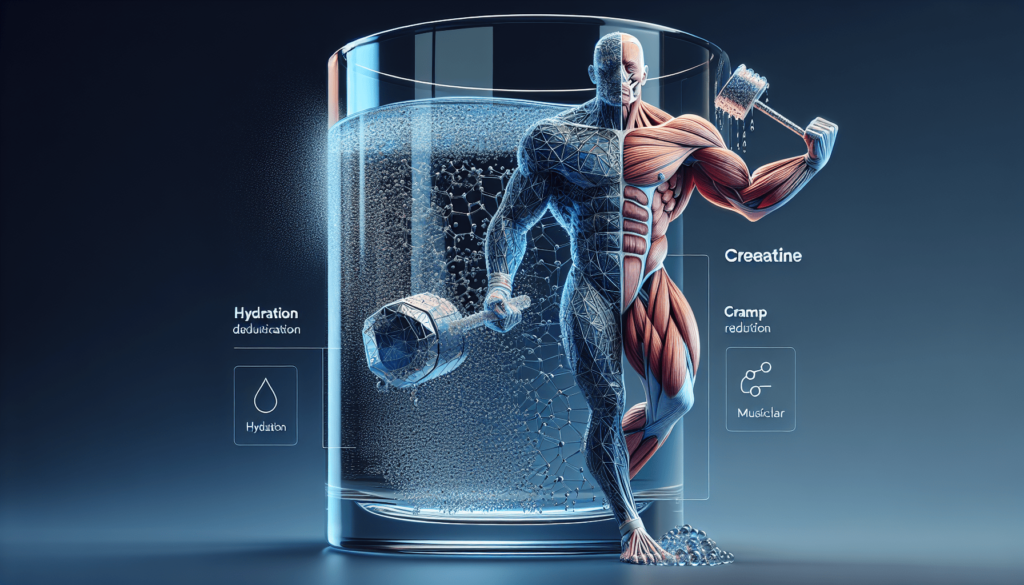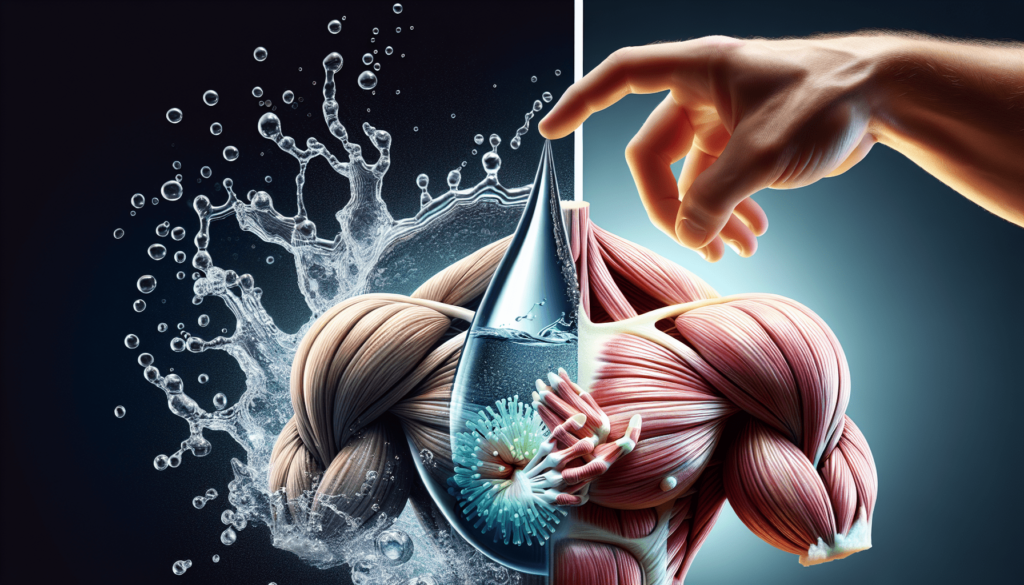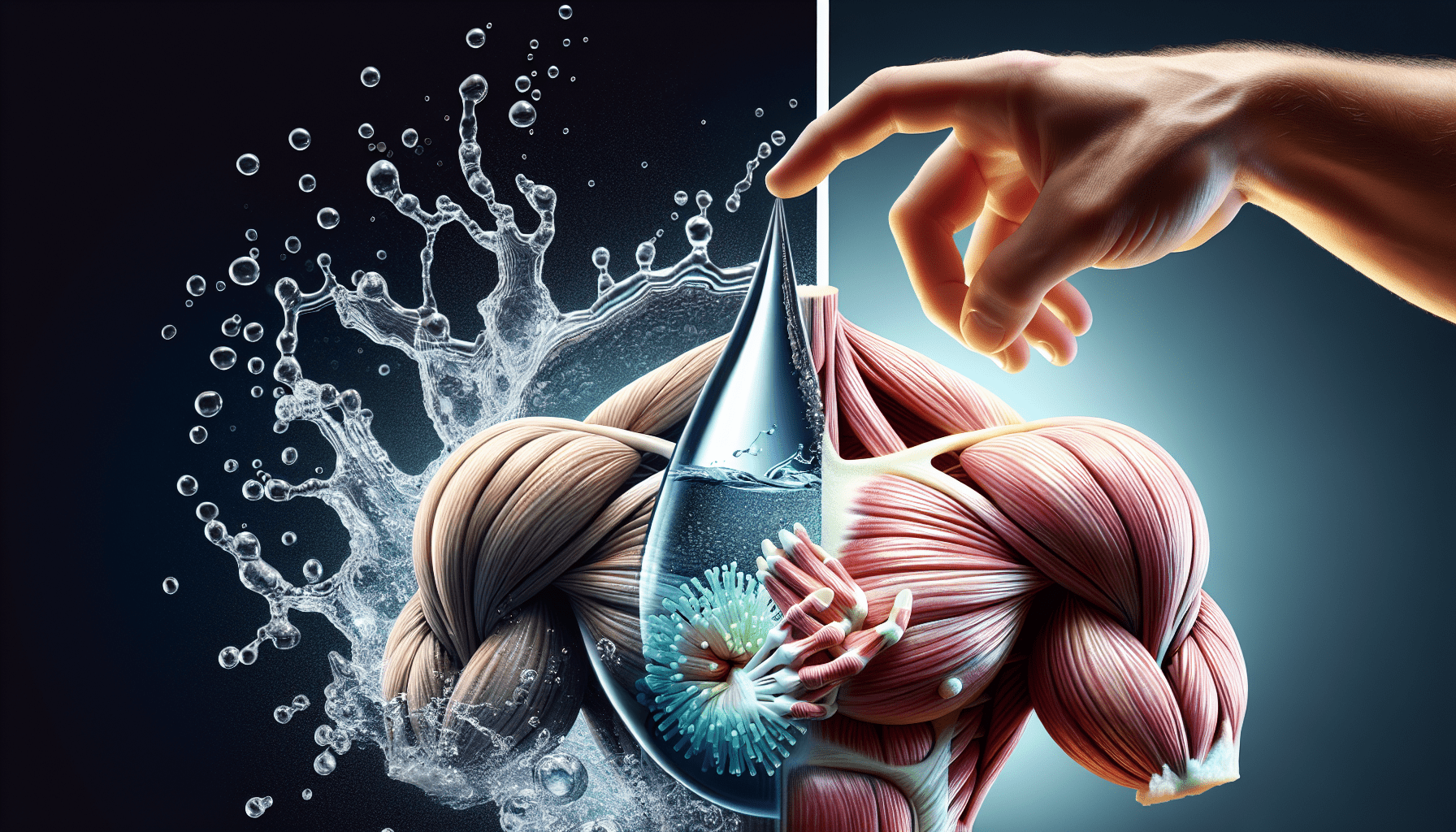Hydration and cramp reduction are two unexpected advantages of creatine. Creatine is a naturally occurring substance found in muscle cells that helps produce energy during exercise. It plays a crucial role in the body’s energy production process and aids in the recycling of ATP, the primary energy carrier in our cells. Creatine supplementation has been proven to enhance strength, increase lean muscle mass, and aid in muscle recovery. Additionally, studies have shown that creatine may actually improve hydration and reduce the risk of cramps by maintaining fluid balance within muscle cells. Despite its popularity and proven benefits, there are still myths and misconceptions surrounding creatine. By understanding the truth about creatine, you can incorporate it effectively into your fitness routine and maximize its benefits.
Understanding Creatine
Creatine is a naturally occurring substance found in muscle cells. It plays a pivotal role in the body’s energy production process, helping muscles produce energy during heavy lifting or high-intensity exercise. One of its key functions is recycling adenosine triphosphate (ATP), the primary energy carrier in our cells, particularly during short bursts of strenuous activity. This makes creatine incredibly important for athletes and fitness enthusiasts. Its popularity in the fitness and sports industry is not just hype – it has been rigorously studied and proven to enhance strength, increase lean muscle mass, and help muscles recover more quickly during exercise. In this article, we will delve into the benefits, importance, and dispel myths and misconceptions surrounding creatine supplementation.
Benefits of Creatine
Enhanced Strength and Muscle Mass
Creatine supplementation has been extensively studied and proven to enhance muscle strength and increase lean muscle mass. By increasing ATP availability, creatine allows for more intense training, leading to improved maximal strength, explosive power, and total work performed during sets of high-intensity exercise. Athletes and individuals seeking to improve their muscle strength and size can greatly benefit from incorporating creatine into their supplement regimen.
Improved Muscle Recovery
Creatine has also been shown to aid in muscle recovery. By replenishing ATP stores and facilitating energy production, creatine supplementation allows for faster recovery between workouts. This means that individuals can train harder and more frequently, ultimately achieving their fitness goals at a faster pace. Additionally, creatine can reduce muscle damage and inflammation associated with intense exercise, further supporting the recovery process.

Importance of Creatine for Athletes
Enhanced Performance
For athletes, creatine supplementation can significantly improve performance across various sports and activities. By increasing ATP availability and allowing for more intense training, creatine enhances muscular power, strength, and endurance. Athletes may experience improvements in sprinting, jumping, throwing, and other explosive movements. This translates to enhanced overall performance, giving athletes a competitive edge in their respective fields.
Increased Endurance
In addition to enhancing muscular power and strength, creatine can also improve endurance. Through its ATP recycling mechanism and energy production process, creatine aids in delaying fatigue and increasing the time to exhaustion during endurance activities. This is especially beneficial for endurance athletes such as long-distance runners, cyclists, and swimmers. By extending the duration and intensity of their training, athletes can improve their endurance capacity and overall performance.
Dispelling Myths and Misconceptions
Safety of Creatine Supplementation
One common myth surrounding creatine is its safety. However, creatine is one of the most researched supplements, and scientific consensus confirms its safety for long-term use in healthy individuals. Numerous studies have found no adverse effects on kidney or liver function from creatine supplementation within recommended doses. As long as individuals follow proper dosage guidelines, creatine supplementation is considered safe and well-tolerated.
Effectiveness of Creatine for Long-Term Use
Another misconception is that creatine loses its effectiveness over time. However, research has demonstrated that creatine remains beneficial even with long-term use. Regular supplementation maintains elevated creatine levels in muscles, ensuring consistent energy production and performance enhancement. The key to sustained effectiveness is ensuring proper dosage and adherence to supplementation protocols.

Hydration and Cramp Reduction with Creatine
Evidence of Creatine’s Effect on Hydration
Contrary to the belief that creatine causes dehydration, research suggests that it may actually improve hydration. Creatine has been associated with maintaining fluid balance within muscle cells, which can contribute to improved hydration levels during exercise. This balance helps prevent dehydration, especially in environments that increase the risk, such as hot and humid conditions. By retaining water within muscle cells, creatine may support optimal hydration and overall athletic performance.
Role of Creatine in Cramp Reduction
Another benefit of creatine supplementation is its potential to reduce the risk of cramps. While muscle cramps are commonly associated with dehydration, emerging evidence suggests that creatine may play a role in preventing and reducing cramps. By maintaining fluid balance and supporting proper muscle function, creatine supplementation may help minimize the occurrence of muscle cramps during exercise.
High-Quality Creatine Supplement
NSF and Informed Sports Certification
When choosing a creatine supplement, it’s essential to prioritize quality and safety. Look for supplements that are certified by reputable organizations such as NSF (National Sanitation Foundation) and Informed Sports. These certifications ensure that the product meets the highest standards for quality, purity, and compliance. By selecting certified products, individuals can have confidence in the effectiveness and safety of their creatine supplementation.
Momentous Creatine Monohydrate
Momentous Creatine Monohydrate is a standout product in the saturated market of creatine supplements. It offers several advantages that set it apart from other options. Momentous Creatine Monohydrate is a single source ingredient, free from sugar, artificial flavors, and fillers. Its purity ensures that individuals are getting pure, unadulterated creatine without any unnecessary additives. Additionally, Momentous Creatine Monohydrate is NSF and Informed Sports certified, underscoring its commitment to quality and safety.

Expanded Benefits of Creatine
Enhanced Cognitive Function
Beyond its well-known impact on muscle and athletic performance, creatine has shown potential in enhancing cognitive function. Research suggests that creatine plays a vital role in energy metabolism within the brain, leading to improved cognitive function, especially under conditions of stress or sleep deprivation. Creatine supplementation has been associated with better memory, attention, and reaction time in diverse populations, including the elderly and vegetarians.
Improved Glucose Metabolism
In addition to its effects on physical performance, creatine has shown promise in improving glucose metabolism. By facilitating efficient glucose transport and utilization within the body, creatine enhances insulin sensitivity. This aspect of creatine’s action is particularly relevant in the context of diabetes management and prevention. Studies have indicated that creatine can increase insulin production, improve muscle sugar storage, and reduce high blood sugar levels.
Optimal Creatine Supplementation Protocol
Loading Phase and Maintenance Dose
To maximize the benefits of creatine supplementation, it is recommended to follow a loading phase followed by a maintenance dose. During the loading phase, individuals typically take around 20 grams of creatine per day, divided into four doses, for 5 to 7 days. This loading phase saturates the muscles with creatine quickly. After the loading phase, individuals can shift to a maintenance dose of 3 to 5 grams per day to maintain elevated creatine levels within the muscles.
Timing and Dosage Recommendations
The timing of creatine supplementation can also play a role in its effectiveness. Research suggests that taking creatine shortly before or after a workout may be slightly more beneficial than taking it at other times. The rationale behind this recommendation is that muscles might be more receptive to creatine uptake around the training session, leading to optimized energy production and performance enhancement. It is important to note that individual responses to creatine supplementation may vary, and finding the timing and dosage that works best for you may require some experimentation.
Addressing Concerns about Creatine
Potential Side Effects
One of the most common concerns about creatine supplementation is the potential for side effects. However, extensive research has consistently shown that creatine is safe and well-tolerated when used within recommended doses. Common side effects, such as gastrointestinal discomfort or water retention, are generally mild and transient. It is essential to follow proper dosage guidelines and consult with a healthcare professional if you have any underlying health conditions before starting creatine supplementation.
Who Should Avoid Creatine
While creatine is generally safe for most individuals, there are certain groups who should exercise caution or avoid supplementation. People with pre-existing kidney or liver conditions, as well as those with kidney dysfunction, should consult with a healthcare professional before using creatine. Additionally, individuals under the age of 18, pregnant or breastfeeding women, and individuals with known sensitivity or allergies to creatine should refrain from supplementation.
Effects on Weight Gain
Another concern often associated with creatine is weight gain. Creatine supplementation may cause a temporary increase in body weight due to water retention within muscle cells. This weight gain is not a result of increased body fat but rather increased muscle hydration. It is important to note that weight gain varies among individuals and is typically modest. For individuals seeking to minimize any potential weight gain, it is recommended to maintain an appropriate caloric intake and engage in regular exercise to promote muscle growth.
Conclusion
In conclusion, creatine supplementation offers numerous benefits for athletes, fitness enthusiasts, and individuals looking to improve their physical performance and overall well-being. Creatine enhances muscle strength, increases lean muscle mass, aids in muscle recovery, improves cognitive function, promotes glucose metabolism, supports heart health, and provides neuroprotection. It is a safe and well-researched supplement that can be incorporated into a comprehensive fitness regimen. However, it is important to prioritize quality, follow optimal supplementation protocols, address concerns, and maintain consistency in diet, exercise, and supplementation. By combining creatine supplementation with a holistic approach, individuals can optimize their fitness goals and achieve long-term success.
